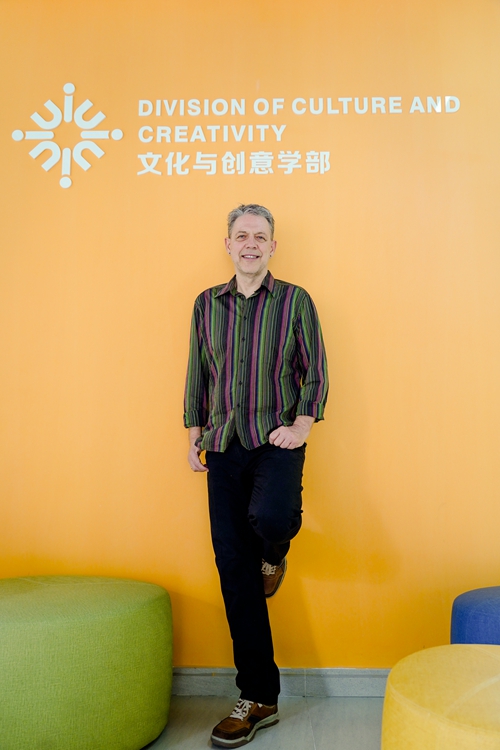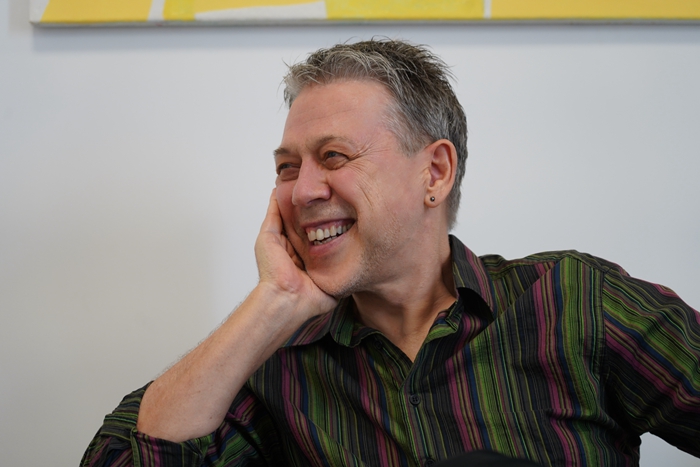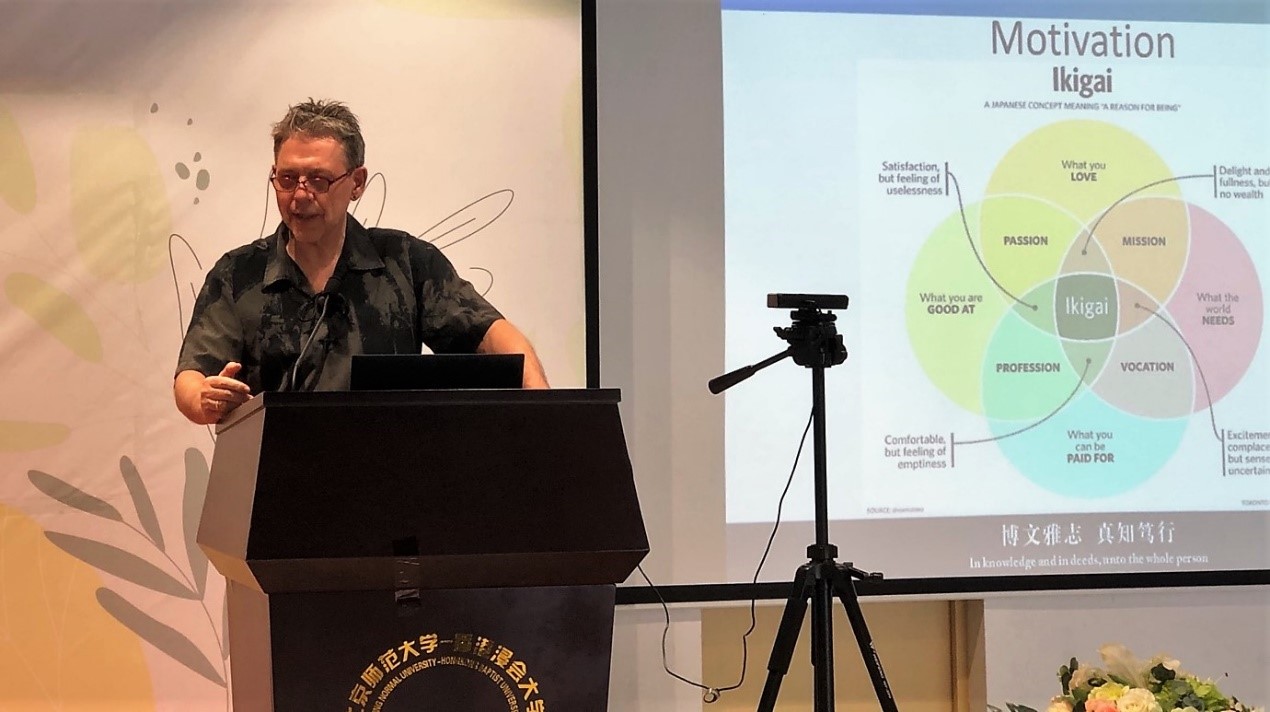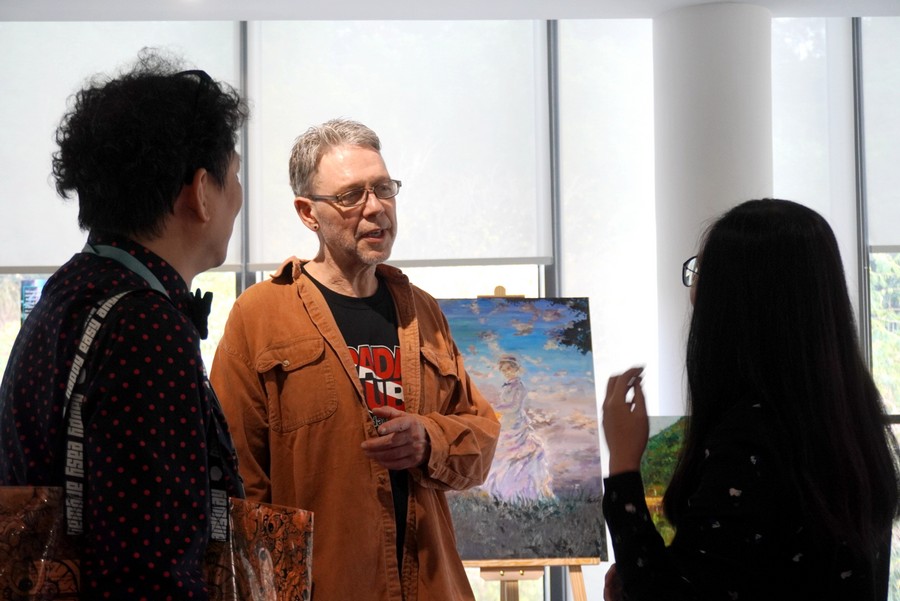Prof Holger Briel has been Dean of UIC's Division of Culture and Creativity since September 2020.
Early life and education
Judging from his background, he is a well-travelled individual. Prof Briel explains that the urge to travel came from being raised in Bad Nauheim, a small resort town near Frankfurt, Germany. As a teenager, he felt more at ease in the big city than in his hometown, which he described as "jaded, affluent and boring". When Prof Briel graduated high-school, he decided to pursue a degree in English and German, two subjects he had already concentrated on in his A levels. The hankering to get out and see more of the world led him to choose a university quite some distance from his hometown, Eberhardt-Karls-Universität, located in Tübingen in south-western Germany.

Prof Holger Briel, Dean of DCC
His language abilities and his desire to engage with others were further awakened during his second semester at university where he started worked as a Teaching Assistant to teach German to international exchange students. He found that he thoroughly enjoyed teaching, which helped him decide on a proper career path, i.e. becoming a teacher.
At the time, his dream was to study in the US, and this dream came true when he was selected for an exchange scholarship to Oregon. He enjoyed the US very much and decided to study for his Masters there, this time at the University of Michigan. He then went back to Europe and studied at the Sorbonne, Paris for a year. Eventually, he returned to the US on a scholarship to complete a PhD in Cultural Theory from the University of Massachusetts. After graduating, it wasn't easy to find a position right away, but he was offered a teaching stint in the Midwest at Indiana State University teaching German and Cultural Studies for two years and quickly took that chance.
However, as he then found out, he felt more at home on the East Coast and soon found himself in New York. The city quickly found a way into his heart, and teaching at NYU was a welcome change with all the stimulation it and its surrounds provided. It didn't prevent him from pursuing other employment opportunities, though, and he ended up accepting a position at the University of Surrey in Guildford in the UK. With his love for city life still intact, though, he chose to live in London and do a 90-minute commute each way to work, which he was willing to do as he "could get a lot of work done on the train".
The London high life only ended after ten years when he received a scholarship from the Greek government and moved on to the University of Athens. There he started working on Digital Humanities, a broad subject that would accompany him for years to come. From Athens he moved to Aristotle University Thessaloniki, teaching Media in their English programme. The next move would bring him to New York University Skopje, where he accepted a position as Dean of Communication and Media Studies.
It was during this time that Prof Briel found his second vocation, scuba diving. He describes it as "the laziest sport in the world, but with great views". From then on, he would split his time between academia and the sea, working as a diving instructor for months on end in Phuket, Thailand, on Bali, Indonesia, in Greece and Cyprus.

Prof Briel has held numerous Visiting Professorship positions and lectured at Oxford, UC Berkeley, Ateneo de Manila, the National University of Malaysia, the National University of Singapore, Universität Rostock and many others. He is also the recipient of numerous research grants and fellowships and a well-published academic with multiple books, book chapters and peer-reviewed articles on Media and Cultural Studies, the Social Sciences, and Tourism and Management Studies to his name. He is the Editor of the IAFOR Journal of Cultural Studies and sits as Co- and/or Joint Editor on several journal editorial boards. Prof Briel is also a member of the EU Council for Higher Education and a past and present Supervisor of many PhD dissertations.
Mixing culture creativity and management was one reason that attracted Prof Briel to his current UIC position. Also, UIC's humanities model played a big part in bringing Prof Brief to the UIC community. Climate and location were two other factors that made the appeal of UIC stand out. "The Greater Bay Area is a booming region in China", said Prof Briel, before unsurprisingly stating that "the weather is a lot more to my liking". Particular to UIC, Prof. Briel mentioned the more formal dress code as opposed to other universities. Other UIC features such as the High Table Dinner and Appreciation Ceremonies also stood out as unique to Prof Briel when he began his work at UIC. He expressed a keen interest to travel around the Greater Bay Area when he has more time, and the COVID pandemic has settled.
Liberal Arts
Due to his varied and international background, Prof. Briel clearly has broad knowledge and a vital understanding of liberal arts, and it certainly shows when he explains the history of liberal arts. Perhaps due to his own academic formation, for Prof Briel liberals arts are the core of university teaching.
The field of ethics is another passion of his which he has studied and taught. In his own life, ethics play a large role, as exemplified in his diet. For many years, he has been a devout vegan because, as he explains, he does not want to be involved in the killing of animals. He was pleased to see the Whole Person Education Programme on campus, as he believes that it goes hand-in-hand with an ethical, pedagogical approach and allows for the understanding and questioning of what a university is. Prof Briel believes that Four-Point Education and the Whole Person Education models are excellent approaches for creating more diverse and open-minded students as well as testing their abilities. He explained that UIC is not just teaching skills but assisting students in learning "life hacks" and the development of their talents for becoming a whole person.

DCC students performing at the multimedia concert in celebration of UIC's 15th anniversary
"Liberal arts students tend to see the larger picture," was Prof. Briel's response when asked about the advantages that liberal arts students have over other students. He explained how students from a liberal arts background think outside of traditional patterns and are also more considerate when it comes to their ideas and their focus on society.
Describing how liberal arts contextualise skills, Prof Briel followed up on how liberal arts students are more likely to ask questions and are more like visionaries when compared to others. He gave an example of how in the late 1980s and early 1990s, many investment and banking companies were specifically recruiting more humanity-trained graduates. They understood that they needed to see beyond their immediate business concentration to conduct their business more holistically and ethically.
Another area that Prof Briel feels that UIC should further concentrate on is "Industry" and looking beyond the four years that the students spend at UIC. Encouraging how to connect students' experiences with potential employers is a route that Prof Briel believes is worth exploring in greater detail.
Division of Culture and Creativity
"Culture and Creativity are at the heart of a liberal arts education," Prof Briel confidently said. When it comes to developments within DCC, at present Prof Briel is overseeing the process of adding three additional programmes to the division. Tourism, Hospitality and Event Management, Game Design, and Animation and Interactive Media are the three new programmes that will be developed in conjunction with industry and university partners. "We are hoping that within our liberal arts setting we can create these programmes in a way that not only gives the students the necessary skills but also lets them adopt a humanistic approach," explained Prof Briel.

Prof Briel speaking at a sharing session
Going into detail about how UIC's location is ideal for the Tourism, Hospitality and Event Management major, Prof Briel believes introducing this programme is a "No-brainer" as Zhuhai is an extraordinary city that boasts a high standard of living with a vast influx of tourists. "The tourism sector is one of the largest industries by growth within China. It will need a lot of people, and we are aiming to train students to fulfil that need."
Another ambitious plan for DCC that Prof Briel is working on is making internships mandatory instead of elective. "I think this will serve the students better." Prof Briel explains. "We need to get them (the students) to experience a real working environment". He feels that students will massively benefit from these internships as they will help them better understand what kind of work environment they are getting themselves into.
Asked to do some blue-sky thinking about additional further developments he would like to see in DCC, Prof Briel brought up the possibility of a Fine Arts programme. He understands that the Whole-Person Education Office already has aspects of such a programme in place and thus it would be easy to create an official programme within DCC. "We have all the pieces of the puzzle on campus already, so why not bring them altogether for a programme? That is something I would like to do over the next few years," Prof Briel announced.

Prof Briel talks to students at an art exhibition held by DCC
As the newest division of UIC's four divisions and justifying the investment UIC has made into this division, Prof Briel is passionate for DCC to reach out and incorporate more stakeholders in its activities. One way that Prof Briel believes will achieve this goal is via a "Parents Taster Day", on which parents are invited to sit in on classes and experience the justifiably famous UIC whole person teaching culture. "These classes will help parents understand a little better how creative DCC actually is and what it is they are paying for". In the same vein, intensifying the alumni network is another area Prof Briel will focus on in the future.
DCC is looking to strengthen its teaching pool with several high profile hires already made and a further number of them coming up over the next few months. The establishment of one or two interdisciplinary research centres will also strengthen DCC's creative output and add to its growing visibility and reputation locally, regional, nationally, and internationally. One highlight of the 2021 calendar will be an international conference on Sinofuturism and Chinse Science Fiction, to be held in November 2021 at UIC.
One final thing Prof Briel stressed was how UIC, despite its almost exponential growth, and due to the warmth of all of his colleagues and staff, still feels like a family. He then added: "I really appreciate this at UIC, and it is something you don't generally get at larger institutions."
From MPRO
Editors: Samuel Burgess, Deen He

